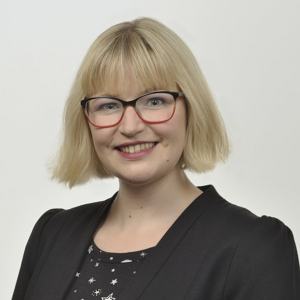Voyage 2050 Viewpoint: Dr Charlotte Götz
In this series from the EPEC Future Research Working Group, Eleni Maria Ravanis talked with three early career planetary science researchers who are lead authors on Voyage 2050 white papers to find out more about how they got involved and what they think planetary science will look like in 2050.

Dr Charlotte Götz is an ESA Research Fellow working at ESTEC in The Netherlands. Originally from Germany, Charlotte completed her PhD in 2019 at the Technical University of Braunschweig in Germany. She is the lead author of the white paper ‘Cometary Plasma Science‘, where she draws on her experience on the Rosetta Mission.
What is the basic idea of your white paper?
The basic idea is that we need to explore the plasma environment of comets with a multi-point measurement. There are a tonne of open questions even after the success of Rosetta that mostly stem from the fact that we can only measure the plasma at one point. Since the interaction of the cometary ions and electrons with the solar wind is very dynamic, a reliable measurement of the solar wind just in front of the comet is needed. The plasma at a comet presents a unique opportunity to study plasma processes like collisions and waves at different length scales and will help us to better understand plasma physics in general.
Space exploration can be a role model for worldwide cooperation and inspire people to work more closely together to achieve these formidable goals.
Dr Charlotte Götz
How did you become involved in the white paper?
We talked about the Voyage 2050 effort at a meeting of the Rosetta Plasma Consortium, which I have been a member of since the start of my PhD. Everyone agreed that it would be worthwhile to write the white paper (or to have a significant contribution to a white paper on plasma at unmagnetised bodies). But people were hesitant to lead the effort due to heavy workloads within the team. So, me and Herbert Gunell said we would lead the white paper, and in the end we decided to put me on as the lead author and representative.
Do not be too constrained by your field; sometimes it is really worthwhile to stray out of your scientific comfort zone and explore new things.
Dr Charlotte Götz
What advice do you have for early career researchers who want to get involved in the follow-up of the white papers presented at this workshop?
Talk to people! The most important thing is to talk to potential collaborators at conferences and meetings, because that is where the really good ideas and connections come from. Science is a collaborative effort and we should strive to be as communicative as possible. Also do not be too constrained by your field; sometimes it is really worthwhile to stray out of your scientific comfort zone and explore new things.
What do you think planetary science will look like in 2050?
I think planetary science will rely more on small-sat technologies. These make it possible to reduce costs, while still providing great amounts of data to explore. I also hope that international cooperation becomes even deeper and more frequent. Some of the really ambitious and exciting topics that were proposed for Voyage 2050 are only achievable by combining the efforts and budgets of many countries and space agencies. Space exploration can be a role model for worldwide cooperation and inspire people to work more closely together to achieve these formidable goals.
Historically, scientists have worked solely with space agencies to perform experiments in space and on planets. Do you think that the growth of private companies bringing payloads in space, e.g., to or around the Moon, is serious and mature enough for scientists to start collaborating with them?
Private companies offer a new way to explore space and there have been collaborations between scientists and companies already. Science and the data from space exploration missions should and must always be publicly available, which is not yet something that private companies are entirely comfortable with. When we get to this stage, I would be happy to collaborate more.
Talk to people! The most important thing is to talk to potential collaborators at conferences and meetings, because that is where the really good ideas and connections come from.
Dr Charlotte Götz
More about Voyage 2050 Viewpoints.

